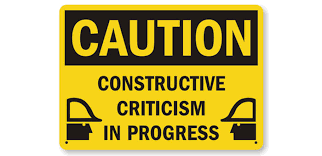Dear Reader, Something to Consider Before Offering Us Feedback

Dear Reader, Something to Consider Before Offering Us Feedback
February 5, 2019
Last week, after our first production of the semester, I finally walked out of our office to go home at 12:56AM. The first email hit my inbox at 5:31AM.
It was the first of the year, but certainly not the first during my time here. I’ve been writing for The Villanovan since I arrived on campus freshman year, and I’ve been an editor since January 2017. This time last year, I began in my current position as Co-Editor-in-Chief. I’ve seen and heard a lot of negative feedback in that time.
Sometimes, it’s small things like pointing out a grammatical error or an incorrect date. Other times, it goes much further, calling our writers incompetent or accusing our editors of ruining The Villanovan’s legacy. One professor is well known by our staff for repeatedly emailing and personally tracking down editors to complain about our delivery process. The morning after the Championship game last spring, I woke up to a string of tweets from a professor slamming us for not having more coverage posted on our website already. Another Twitter user called a writer “terrible and pathetic,” because he disagreed with a satirical article she wrote.
Some of you who read this article will write me off as another whiny college kid who can’t handle criticism and expects participation awards just for showing up. I want to make it clear that I’m not here to complain. I can take criticism, and trust me, I’ve come to expect it. I even understand that it’s important and that it can help us do better, grow and learn. But I’m here to remind you that we’re student journalists and to tell you that what you say to us matters. I’ve seen the way it affects my peers, and I’ve felt the way that it affects me. The support you do or don’t give us makes an impact on us.
We’re not lazy, and we’re not stupid. We don’t make mistakes on purpose. We work long hours. Our Tuesday nights are shot, each and every week. I was actually pretty excited to be leaving the office before 1 a.m. last Tuesday. I’ve stayed much later. Writers add their articles to the list of papers and projects they have to get done in a week. We don’t get paid, and we don’t get academic credit. We don’t do this to be the cool kids on campus. Most of our writers and editors aren’t majoring in Journalism or Communication or anything remotely related. Their time and efforts for The Villanovan won’t translate to job offers or relevant work experience.
We do this because we want to. Because it interests us, and because we think it’s important. This is my second year leading a staff of new editors. My second year interviewing student applicants and hearing the passion in their voices when they talk about the ideas they want to bring to life as editors. Seeing the fear in their eyes when they walk into the office to do production and layout for the first time and the pride on their faces when they finally export and send their pages to print. I’ve also seen the way their faces deflate when they read those nasty emails and comments and the way that their excited optimism turns to cynicism as the months pass and the critiques exceed the compliments.
It’s also my second year meeting new students and telling them that yes, they can get involved and become writers even if they’ve never done anything like this before. That’s a big part of our role here on campus: to give students an opportunity to get involved and to learn. To me, that seems more important than having a flawless, professional-quality newspaper. I’m always surprised how many of the professors that we hear from don’t seem to see things the same way.
It would be wrong to write this editorial and fail to mention that we get nice emails too, sometimes. There are alumni who end every sentence with an exclamation point when they reply to say they’re willing to be interviewed for an article and administrators who tell us that we’re doing a good job. Last year, one alumnus’ dad wrote me a multi-paragraph email thanking me for taking the time to interview and write about his daughter. I save those emails, too. They make my day. They remind me why I do this. But it’s true what they say. You can hear 99 positive comments and one negative one, and it’s the negative one that sticks in your head.
So, please, if you have something to tell us, think twice about what you’re saying and why you’re saying it.
You think the quality of writing in an article was poor, and you want to take the time to email me to point it out? Fair enough. It would be great, and just as helpful, if you could also point out an article you read and thought was well done. You wrote for your college newspaper back when you were a student and understand the hard work it takes to produce an issue? Fantastic. We’d love to have you get involved to mentor and help new student writers. You noticed that we wrote 2016 instead of 2019? I understand that you maybe can’t help but point that out, but it would be nice if you made a joke instead of a nasty insult. You read an article, and you liked it? Thank you. I’d be really happy to get an email about that and forward it to the person who wrote it. Trust me, it can and will make their day.
Constructive criticism helps. Offers to help are appreciated. Words of support and encouragement make an impact. We really are trying our best, and kindness really does matter.










